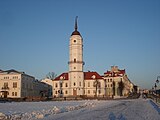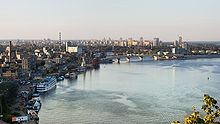
|
Welcome to the Belarus Portal |
Сардэчна запрашаем да беларускага партала!
 |
 |

| |
Belarus, officially the Republic of Belarus, is a landlocked country in Eastern Europe. It is bordered by Russia to the east and northeast, Ukraine to the south, Poland to the west, and Lithuania and Latvia to the northwest. Covering an area of 207,600 square kilometres (80,200 sq mi) and with a population of 9.1 million, Belarus is the 13th-largest and the 20th-most populous country in Europe. The country has a hemiboreal climate and is administratively divided into six regions. Minsk is the capital and largest city; it is administered separately as a city with special status.
Between the medieval period and the 20th century, different states at various times controlled the lands of modern-day Belarus, including Kievan Rus', the Principality of Polotsk, the Grand Duchy of Lithuania, the Polish–Lithuanian Commonwealth, and the Russian Empire. In the aftermath of the Russian Revolution in 1917, different states arose competing for legitimacy amid the Civil War, ultimately ending in the rise of the Byelorussian SSR, which became a founding constituent republic of the Soviet Union in 1922. After the Polish-Soviet War, Belarus lost almost half of its territory to Poland. Much of the borders of Belarus took their modern shape in 1939, when some lands of the Second Polish Republic were reintegrated into it after the Soviet invasion of Poland, and were finalized after World War II. During World War II, military operations devastated Belarus, which lost about a quarter of its population and half of its economic resources. In 1945, the Byelorussian SSR became a founding member of the United Nations, along with the Soviet Union. The republic was home to a widespread and diverse anti-Nazi insurgent movement which dominated politics until well into the 1970s, overseeing Belarus' transformation from an agrarian to industrial economy.
The parliament of the republic proclaimed the sovereignty of Belarus on 27 July 1990, and during the dissolution of the Soviet Union, Belarus gained independence on 25 August 1991. Following the adoption of a new constitution in 1994, Alexander Lukashenko was elected Belarus's first president in the country's first and only free election after independence, serving as president ever since. Lukashenko heads a highly centralized authoritarian government. Belarus ranks low in international measurements of freedom of the press and civil liberties. It has continued a number of Soviet-era policies, such as state ownership of large sections of the economy. Belarus is the only European country that continues to use capital punishment. In 2000, Belarus and Russia signed a treaty for greater cooperation, forming the Union State. (Full article...)
Selected article
The Dnieper (/(də)ˈniːpər/), also called Dnipro (/dəˈniːproʊ/) or Dniapro, is one of the major transboundary rivers of Europe, rising in the Valdai Hills near Smolensk, Russia, before flowing through Belarus and Ukraine to the Black Sea. Approximately 2,200 km (1,400 mi) long, with a drainage basin of 504,000 square kilometres (195,000 sq mi), it is the longest river of Ukraine and Belarus and the fourth-longest river in Europe, after the Volga, Danube, and Ural rivers.
In antiquity, the river was part of the Amber Road trade routes. During the Ruin in the later 17th century, the area was contested between the Polish–Lithuanian Commonwealth and Russia, dividing what is now Ukraine into areas described by its right and left banks. During the Soviet period, the river became noted for its major hydroelectric dams and large reservoirs. The 1986 Chernobyl disaster occurred on the Pripyat River, a tributary of the Dnieper, just upstream from its confluence with the Dnieper. The Dnieper is an important navigable waterway for the economy of Ukraine and is connected by the Dnieper–Bug Canal to other waterways in Europe. During the 2022 Russian invasion of Ukraine, certain segments of the river are part of the defensive lines between territory controlled by Russians and Ukrainians. (Full article...)Selected biography

Siarhei Mikhalok (born January 19, 1972, Belarusian: Сяргей Міхалок, Russian: Серге́й Михалок, Sergey Mikhalok) is a Belarusian rock musician and actor. He was the frontman of the ska punk band Lyapis Trubetskoy that he dissolved on September 1, 2014. He was the frontman of the band Brutto, now leads Drezden.
Born into a family of a Soviet military man in Dresden, East Germany. The family was originally from Minsk. He grew up in Siberia. (Full article...)General images
Selected picture
Did you know (auto-generated)

- ... that Stsiapan Putsila faces criminal charges in Belarus—as does the Polish judge who refused to extradite him?
- ... that Rufina Bazlova has used traditional embroidery to depict protests in Belarus?
- ... that Obliskomzap People's Commissar for Public Charity V. L. Mukha resigned in protest over the dispersing of the First All-Belarusian Congress?
- ... that museum director Alena Aladava rebuilt the Belarusian national art collection in the aftermath of the Second World War?
- ... that Belarusian activist Vitaly Shishov, the head of an organisation helping people escape repression following the 2020–2021 Belarusian protests, was aware of risks to his life before he was found dead?
Featured articles
Related portals
Post Soviet states
Other countries
More Did you know
- ...that Brest Fortress in Belarus was belatedly honoured by the USSR as a Hero Fortress in 1965 for its resistance to the Nazi invasion in 1941?
Topics
Subcategories
New article announcements
This page was created using Portal:Belarus/New article announcements. It is created for everyone interested in Belarus-related articles to notice everything new.
Urgent announcements
- NONE
This list was generated from these rules. Questions and feedback are always welcome! The search is being run daily with the most recent ~14 days of results. Note: Some articles may not be relevant to this project.
Rules | Match log | Results page (for watching) | Last updated: 2024-04-28 19:41 (UTC)
Note: The list display can now be customized by each user. See List display personalization for details.
- 2024 Individual Ice Speedway World Championship (edit | talk | history | links | watch | logs | tools) by Pyeongchang (talk · contribs · new pages (35)) started on 2024-04-28, score: 20
- Molchad Ghetto (edit | talk | history | links | watch | logs | tools) by Rafi Chazon (talk · contribs · new pages (13)) started on 2024-04-28, score: 20
- Lida Ghetto (edit | talk | history | links | watch | logs | tools) by Rafi Chazon (talk · contribs · new pages (13)) started on 2024-04-28, score: 20
- 7th All-Belarusian People's Assembly (edit | talk | history | links | watch | logs | tools) by Mupper-san (talk · contribs · new pages (16)) started on 2024-04-28, score: 106
- Mark-Frederick Addo (edit | talk | history | links | watch | logs | tools) by Das osmnezz (talk · contribs · new pages (53)) started on 2024-04-27, score: 80
- Artur Matveychik (edit | talk | history | links | watch | logs | tools) by Das osmnezz (talk · contribs · new pages (53)) started on 2024-04-27, score: 60
- Georgiy Tatarashvili (edit | talk | history | links | watch | logs | tools) by Das osmnezz (talk · contribs · new pages (53)) started on 2024-04-27, score: 30
- Habib Omar Fofana (edit | talk | history | links | watch | logs | tools) by SonOfBasra (talk · contribs · new pages (4)) started on 2024-04-26, score: 30
- St. Onuphrius Monastery in Jabłeczna (edit | talk | history | links | watch | logs | tools) by Oliwiasocz (talk · contribs · new pages (22)) started on 2024-04-26, score: 32
- Battle of Lipniszki (edit | talk | history | links | watch | logs | tools) by Joe Roe (talk · contribs · new pages (5)) started on 2024-04-26, score: 20
- Andrey Sinichin (edit | talk | history | links | watch | logs | tools) by Das osmnezz (talk · contribs · new pages (53)) started on 2024-04-26, score: 80
- List of translations of The Lord of the Rings (edit | talk | history | links | watch | logs | tools) by Chiswick Chap (talk · contribs · new pages (7)) started on 2024-04-24, score: 20
- Chroniclers of Volyn and Ukraine (edit | talk | history | links | watch | logs | tools) by Nederlandse Leeuw (talk · contribs · new pages (19)) started on 2024-04-23, score: 26
- European Rowing U19 Championships (edit | talk | history | links | watch | logs | tools) by Rowing007 (talk · contribs · new pages (23)) started on 2024-04-23, score: 20
- Lucas Fratzscher (edit | talk | history | links | watch | logs | tools) by Dem1997 (talk · contribs · new pages (10)) started on 2024-04-22, score: 20
- Battle of Nowa Woda (edit | talk | history | links | watch | logs | tools) by Wladekimperialny (talk · contribs · new pages (3)) started on 2024-04-22, score: 20
- List of current automobile manufacturers by country (edit | talk | history | links | watch | logs | tools) by Sable232 (talk · contribs · new pages (3)) started on 2024-04-21, score: 20
- 2003 NHL entry draft (edit | talk | history | links | watch | logs | tools) by Robertsky (talk · contribs · new pages (222)) started on 2024-04-20, score: 20
- 1993 NHL entry draft (edit | talk | history | links | watch | logs | tools) by Robertsky (talk · contribs · new pages (222)) started on 2024-04-20, score: 20
- 2021 NHL entry draft (edit | talk | history | links | watch | logs | tools) by Robertsky (talk · contribs · new pages (222)) started on 2024-04-20, score: 20
- 2004 NHL entry draft (edit | talk | history | links | watch | logs | tools) by Robertsky (talk · contribs · new pages (222)) started on 2024-04-20, score: 20
- Zapad 2013 (edit | talk | history | links | watch | logs | tools) by Piotrus (talk · contribs · new pages (11)) started on 2024-04-19, score: 40
- Pabradė Training Area (edit | talk | history | links | watch | logs | tools) by Mindaur (talk · contribs · new pages (2)) started on 2024-04-18, score: 20
- 2024 Europe spring heatwave (edit | talk | history | links | watch | logs | tools) by AustroHungarian1867 (talk · contribs · new pages (1)) started on 2024-04-17, score: 20
- Danilovich (edit | talk | history | links | watch | logs | tools) by Nyuhn (talk · contribs · new pages (2)) started on 2024-04-16, score: 40
- Bonica Brown (edit | talk | history | links | watch | logs | tools) by Tempelz (talk · contribs · new pages (2)) started on 2024-04-15, score: 20
- Yvonne Ejim (edit | talk | history | links | watch | logs | tools) by JTtheOG (talk · contribs · new pages (52)) started on 2024-04-15, score: 20
Associated Wikimedia
The following Wikimedia Foundation sister projects provide more on this subject:
-
Commons
Free media repository -
Wikibooks
Free textbooks and manuals -
Wikidata
Free knowledge base -
Wikinews
Free-content news -
Wikiquote
Collection of quotations -
Wikisource
Free-content library -
Wikiversity
Free learning tools -
Wikivoyage
Free travel guide -
Wiktionary
Dictionary and thesaurus
Sources
- ^ Kopka, D. (2011). Welcome to Belarus: Passport to Eastern Europe & Russia. Passport Series. Milliken Publishing Company. p. 6. ISBN 978-0-7877-2770-3. Retrieved July 28, 2019.
- ^ Harshav, Benjamin. Marc Chagall and his times: a documentary narrative. Contraversions: Jews and Other Differences. Stanford University Press; 1 edition. August 2003. ISBN 0804742146.





































![Image 1White storks on their nest in Belarus, 2009. The Stork is the national symbol of Belarus.[1]](http://upload.wikimedia.org/wikipedia/commons/thumb/4/41/BY_stork1_2009.jpg/80px-BY_stork1_2009.jpg)







![Image 10The Fiddler, 1912–1913, by Marc Chagall, a Russian-French artist of Belarusian Jewish origin[2]](http://upload.wikimedia.org/wikipedia/en/thumb/4/4a/Image-Chagall_Fiddler.jpg/101px-Image-Chagall_Fiddler.jpg)




























